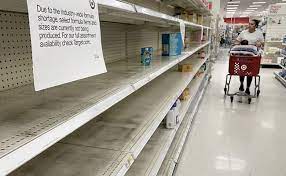Top infant formula manufacturers Reckitt Benckiser and Nestle have increased supplies to the US to address a shortage that has left shelves bare and parents worried.
Since major U.S. manufacturer Abbott Laboratories recalled formulas in February after complaints of bacterial illnesses, baby formula aisles in U.S. supermarkets have been ravaged.
Abbott announced on Monday that it has reached an agreement with the US Food and Drug Administration to resume baby formula production at its Michigan factory, marking a significant step toward ending the statewide shortage.
Meanwhile, other infant formula manufacturers have increased output and shipped additional supplies to the US.
According to reporters, Reckitt Benckiser is increasing baby formula manufacturing by around 30% and providing more regular delivery to US shops.
Reckitt, which creates its U.S. formula in three facilities in Michigan, Indiana, and Minnesota, has given factories “unlimited overtime” to put in extra shifts, according to Robert Cleveland, senior vice president, North America, and Europe Nutrition at Reckitt.
Reckitt supplied little over a third of the US infant formula market prior to the Abbott recall, compared to Abbott’s around 44%. Reckitt Benckiser, based in the United Kingdom, told reporters that it now supplies more than half of all baby formula in the country.
“We frequently pack a full truck before shipping it. We’re not doing it for the sake of timeliness. We’re just getting it out the door after filling it with as much merchandise as we can “Cleveland said.
The Food and Drug Administration announced on Monday that it will allow baby formula imports from overseas manufacturers who do not normally sell their products in the United States.
Nestle said in an emailed statement to reporters on Tuesday that it is flying baby formula supplies from the Netherlands and Switzerland to the United States.
The world’s largest packaged food company says it is bringing Gerber baby food formula from the Netherlands and Alfamino infant formula from Switzerland to the United States.
The company stated, “We prioritized these goods because they serve a key medical purpose as they do for babies with cow’s milk protein allergies.” “Both products were already being imported, but we accelerated shipments by air to meet immediate demands.”

















